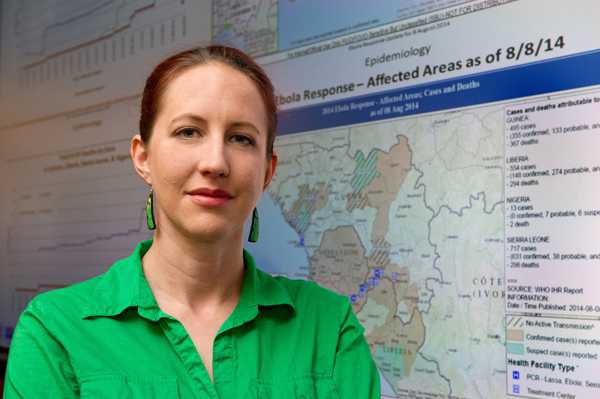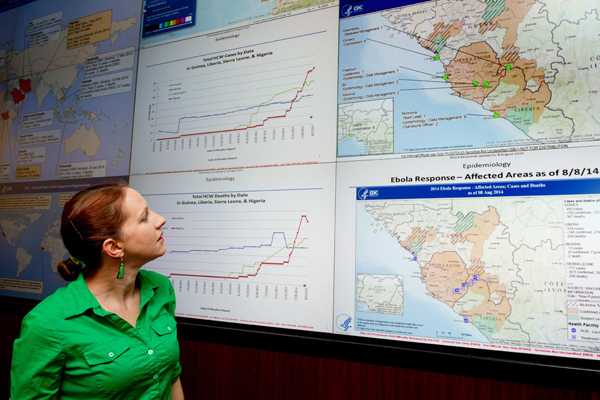CDC Responds to the 2014 Ebola Outbreak: Molly
Molly: "Focusing on Local Organizations to Create Sea Change"

CDC Disease Detective Molly stands near the electronic information wall in the CDC’s Emergency Operations Center in Atlanta
Molly is a health communications specialist for CDC, and this week she deployed in support of the Ebola outbreak.
"I will be going to West Africa as a health communications specialist to provide health education and health promotion support," Molly explains. "One thing I was surprised about for this outbreak is that there has been less resistance to changing burial customs than anticipated," she says. "They do recognize that touching the dead bodies is an issue. That is not to say that burials now are done without respect. They are still done in a very respectful way, just without touching. This is where expressing compassion is very important –that you feel grief and sadness that you are asking them to change these really important rituals."
To help with the process of community education, Molly will be involved with efforts around mass communication, for instance, creating radio spots, and perhaps working with trainers training the contact tracers. "Instead of small targeted interventions, we hope to create a sea change in overall opinion."
When asked why she is a good fit for the job at hand, Molly explains, "I am used to being deployed. I have a lot of cross cultural competence. And I speak French."
No stranger to work in Africa, Molly served for more than three years in the Peace Corps in Mauritania, West Africa, as a community health education volunteer. She has also worked with Global Health Action, an Atlanta-based organization, to develop a curriculum and conduct training for community health workers in Haiti. She has been deployed for numerous other CDC responses, including the 2012 multistate meningitis outbreak, 2009 H1N1 influenza pandemic, 2010 earthquake in Haiti, and the 2010 Gulf of Mexico Oil Spill.
Molly knows first-hand why having boots on the ground is so important. She plans to work with local residents to get their points of view. "We want to focus on local organizations for the crucial task of contact tracing."

CDC Disease Detective Molly stands near the electronic information wall in the CDC’s Emergency Operations Center in Atlanta
From her past deployments, she also learned the importance of cultural competence and the ability to adapt one’s behavior to work more effectively in another culture. "This does not mean masking who you are, but using symbols and actions to communicate more effectively," she says.
In her previous work in Nigeria, she regularly wore West African clothing – a simple strategy that created immediate interpersonal connections. "Everyone turned to me with big welcoming faces when I came into the UNICEF office," she says." They gave much more respect and help because I was willing to adapt my style to fit them, and not the other way around."
Molly notes that cultural competence can even mean just learning greetings in the local language. It shows respect to make these kinds of gestures.
As for the impact she hopes to have with this response, she explains, "We’ll start to turn the corner when the general population feels much more knowledgeable about how to protect themselves and their families against Ebola — and how to take helpful actions."
Molly’s undergraduate degree is in philosophy. "I feel all world views are equally as valid as my own. Isn’t there a way to talk about this that makes sense to both of us? I don’t want to indoctrinate you. I want to learn something myself. And everywhere I go my worldview gets bigger."
In preparing for her deployment, Molly has been revisiting West African cultural norms and learning about what is changing in light of this current outbreak.
As for her personal view and preparedness process, Molly says her questions were actually answered with questions. "We need to ask ourselves four important questions: Will you come into contact with bush meat or bat meat? Are you going to be a caregiver for a loved one or spouse with Ebola? Will you be providing healthcare to Ebola patients? Will you touch the dead body of anybody who has died of Ebola? If all those answers are no, the risk is quite slight."
Armed with these questions and an understanding of how Ebola is spread, she feels that she’s been given the training and the tools needed to keep safe. "I’m not scared at all about getting Ebola myself."
- Page last reviewed: August 18, 2014
- Page last updated: August 18, 2014
- Content source:


 ShareCompartir
ShareCompartir